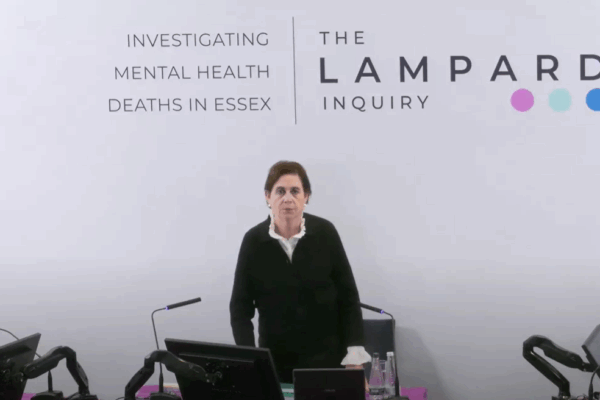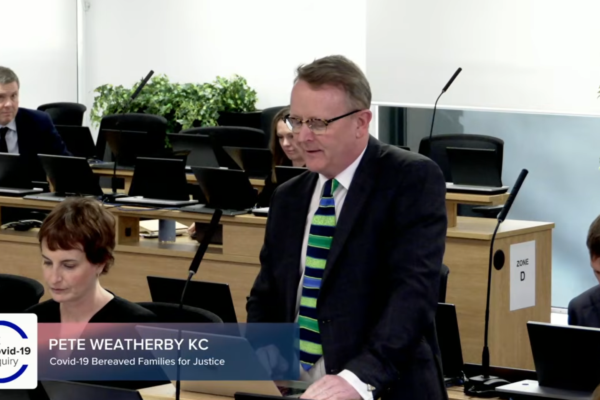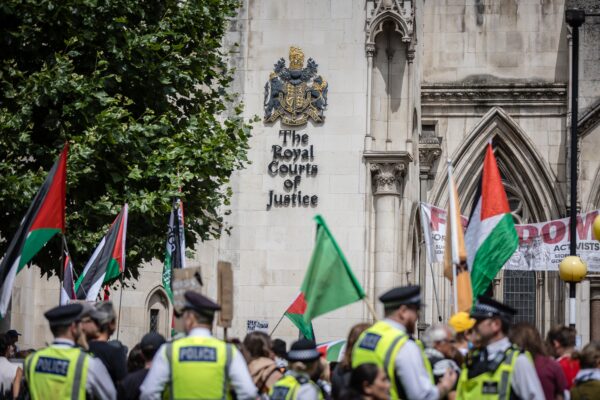The COVID-19 Inquiry: what happens next?
18 January 2024

The UK Covid-19 Inquiry was set up to examine the UK’s response to and impact of the Covid-19 pandemic, and to learn lessons for the future.
The announcement of the Inquiry in May 2021 followed extensive campaigning work by Covid Bereaved Families for Justice UK, who want to ensure that lessons are learned as soon as possible to prevent other families from suffering as they have.
The work of the Inquiry is structured in different sections, or ‘modules’ which deal with specific aspects of the response to Covid-19 and the impact of the pandemic.
Progress so far
The evidence hearings for Module 1 took place between June and July 2023 and looked at whether the pandemic was properly planned for and whether the UK was adequately ready for that eventuality.
Module 2 hearings ran from October to December 2023, and investigated core UK decision-making and governance. Evidence was given by former Prime Minister Boris Johnson, his former adviser Dominic Cummings and a host of other key decision-makers involved in the response to the pandemic from early January 2020 to February 2022.
Following the conclusion of the oral evidence, Core Participants to the Inquiry made oral closing submissions. Submissions for Covid Bereaved Families For Justice UK were made by Anna Morris KC and can be found here.
Core Participants have also been given the opportunity to provide written closing submissions. These will be published on the Inquiry’s website soon. Written submissions give Core Participants the chance to cover the key evidence received in Module 2, including the extensive written and documentary evidence, in more detail.
According to the Inquiry, 364,996 documents, comprising 3,061,454 pages of evidence, have been collected so far.
What’s next?
Module 2 has three sub-modules which look at decision making in Northern Ireland, Scotland and Wales. Hearings for Module 2a, looking into the response to the pandemic in Scotland, started this week.
Scotland is also holding a separate inquiry, which started hearing evidence about the health and social care impacts of the pandemic in October 2023. The Scottish Covid-19 Inquiry has now paused hearings in order to allow the UK Inquiry to hear Module 2a evidence in Edinburgh.
Module 2b will look at decision-making and political governance in Wales. Evidence hearings start on 27 February 2024 in Cardiff.
Oral hearings for Module 2c, focused on Northern Ireland, start in Belfast in April.
Module 3, which will look at the impact of the Covid-19 pandemic on healthcare systems in the four nations of the UK, is due to start hearing evidence later this year.
Although it was originally the intention that hearings for Module 4, focused on vaccines and therapeutics, would start in the summer of 2024, the Inquiry recently confirmed that the start date would be delayed in order to give organisations more time to provide evidence for Module 3. The Inquiry has said that it will provide further details on the rescheduled public hearing dates in the next few weeks.
Future work
The Inquiry has so far ‘opened’ two further modules; Module 5 and 6, set to investigate procurement and the care sector, although the dates for evidence hearings have not yet been confirmed.
Information about further modules is expected in the coming months. The Inquiry has said that these will cover both ‘system’ and ‘impact’ issues, including:
- Testing and tracing
- The Government’s business and financial responses
- Health inequalities and the impact of Covid-19
- Education, children and young persons
- Other public services, including frontline delivery by key workers.
When is the Inquiry likely to report?
Baroness Hallett has confirmed that she does not want the Inquiry hearings to run beyond her original aim of summer 2026. This would mean that a final report is likely to be published in 2027.
It is also clear that Baroness Hallett intends to publish interim reports as soon as possible after hearings end. The first of these, looking at Module 1 issues of resilience and preparedness, is expected this summer.
This update was written by Lily Lewis, a member of the team representing the Covid Bereaved Families for Justice UK group in Module 2 of the Inquiry.





